home | metro santa cruz index | movies | current reviews | film review

THE GREAT BEYOND: WALL-E conquers space in the new Pixar feature.
Load Lifter
Pixar's 'WALL-E' makes us want to say, 'Domo arigato, Mr. Roboto.'
By Richard von Busack
Writer Neil Gaiman's embodiment of Death in Sandman comics, a salty, pretty goth girl in a black tank top, explained her role in the scheme of things: "When the last living thing dies, my job is finished. I'll put the chairs on tables, turn out the lights and lock the universe behind me when I leave." The meek cube-bot WALL-E seems to have inherited the Earth. WALL-E (Waste Allocation Load Lifter--Earth Class) and his unkillable pet cockroach are the last creatures moving on a planet veiled from the sun with smog and space junk. It's a rusty scrapyard from pole to pole; spires of eroded skyscrapers poke out of the midden of discarded truck tires, fractured parking lots and tumbled-down freeways. The occasional flickers of life flash on the electronic billboards, outside a Buy N Large supermegastore. The only clue to the disappearance of humanity is the beaming face of Buy N Large CEO and president of the Earth, Shelby Forthright (Fred Willard). He rallies the human race for an ark ride until the terrestrial cleanup can be continued. The cleanup continues apace, as it has done for 700 years.
After solar-powering up for the day, WALL-E crunches debris into metal cubes and stacks them. Sometimes he hides from the dust storms that roar in without warning. At the end of the day, he wearily takes off his tractor treads, as if they were too-tight boots, and watches his decaying old Beta tape of the 1969 Hello, Dolly.
When a spacecraft lands, WALL-E is not alone anymore. A white, translucent egg-shaped robot called Eva arrives. She glides noiselessly, but she's armed: a quick-draw artist, she carries a large and horrible blaster. Seemingly, her only word is her term for duty: "Directive."
The similarly wordless WALL-E falls in love with this robot, and he seeks a response in the changing shape of Eva's eyes, glowing in a black screen. When she leaves the planet, WALL-E tries to follow. And here, always for Pixar Studios, the emotional power and graphic simplicity of a classic cartoon mixes with the fiendishly difficult technique of 3-D animation.
WALL-E's coming attractions seemed underwhelming. Likely for commercial reasons, these previews stressed the cuteness of the robot instead the decay of his world. Will that decay be a sticking point for children? Who knows, but it's smothering a vital art to insist that animation is only meant to keep kids placid. WALL-E discusses the fate of the Earth, giving our future the kind of emotional power that Disney Studios used to use only for stories of separation anxiety between mothers and children.
The film is a thing of beauty. As a character, WALL-E is a prime pantomime comedian. The angled binocular eyes look like the thick-framed glasses and recall the demurely worried expression of early-period Woody Allen. The burbling primitive-synthesizer chirps that WALL-E emits, all engineered by Lucasfilm's robot vocal coach Ben Burtt, are as expressive as a good pop song.
In the second half of the film, WALL-E changes into a tangy--even biting--satire of a future race of humans. They have devolved into babylike blobs with stubby limbs, floating in deck chairs, hovering through spotless corridors that are part Las Vegas, part Lido deck of a gargantuan stellar cruise ship.
Director Andrew Stanton references some of the classic sci-fi films: obvious ones like Alien and 2001: A Space Odyssey, and less commonly known ones like This Island Earth. One strong apparent source is Silent Running, Douglas Trumbull's space epic that was made in a mid-1970s wave of ecological panic, before we got distracted for 30 years by far more important matters than human survival. But WALL-E isn't merely a series of put-ons of science fiction.
This most mature Pixar film to date is, among other things, a solace for preservationists, who feel that they are part of a vanishing world. WALL-E's sessions with his favorite tape, the last copy of Hello, Dolly, insists on the power of cinema to persist as more than just downloadable content. Thomas Newman's score haunts this haunted planet, and orchestrates a space ballet (how else can mute lovers communicate?). In moments of classic pop, WALL-E shows its class as a soulful, unpumped-up romance. Escorting his unlikely love, the battered, noble robot shows her through his wonderland, his worldwide junkyard, as Louis Armstrong's version of "La Vie en Rose" echoes around them.
![]() WALL-E (G), directed by Andrew Stanton, written by Stanton and Jim Capobianco, with the voices of Ben Burtt and Fred Willard, opens Friday countywide.
WALL-E (G), directed by Andrew Stanton, written by Stanton and Jim Capobianco, with the voices of Ben Burtt and Fred Willard, opens Friday countywide.
Send a letter to the editor about this story.
|
|
|
|
|
|